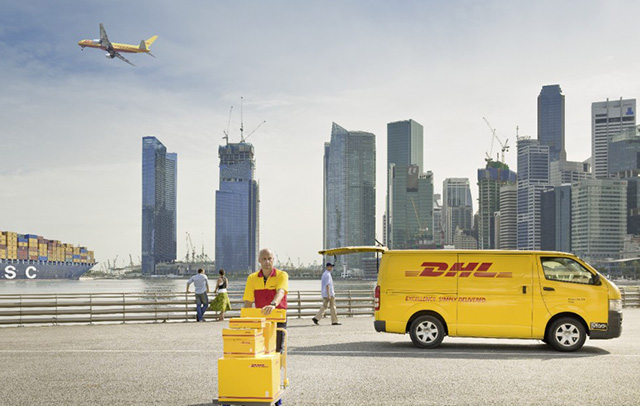Shipping costs play a vital role in the success of small and medium-sized enterprises (SMEs) engaged in international trade. Understanding and accurately calculating shipping costs is vital for efficient logistics and to maintain profitability. In this comprehensive guide, DHL Express will walk you through the key factors involved in determining shipping costs for your SME, helping your business to make informed decisions.
1. Weight
The weight of the parcel is determined by either the actual weight per kg or the volumetric (dimensional) weight, whichever is higher, and is a key factor in determining shipping costs.
Dimensional weight refers to the weight of a parcel considering its size or, in layman’s terms, its volume. It measures the space a parcel will occupy during transportation, comparing it to its actual weight. This helps couriers such as us determine the appropriate shipping cost based on the parcel's size and weight.
For larger but lightweight shipments, where the dimensional weight exceeds the actual weight, costs are determined based on the space the consignment occupies on the aircraft. Here’s how to calculate the volumetric weight:
Volumetric weight | Length x height x width of package (in centimetres) ___________________________________________ 5000 |
2. Dimensions
Shipping costs are influenced not only by weight but also by the dimensions of your package. Larger and bulkier items occupy more space, leading to increased expenses. To ensure cost-effective shipping, it is essential to accurately measure the length, width, and height of your shipments. Take into account dimensional weight calculations to determine the most economical shipping method too.
3. Exceptional activity and fuel surcharges
In addition to weight and dimensions, it's crucial to consider exceptional activity and fuel surcharges that may impact your shipments. These surcharges cover additional costs related to unique circumstances or fuel price fluctuations. Leading international logistics providers like DHL Express incorporate these charges to maintain reliable and efficient delivery services.
Stay informed about the specific surcharges relevant to your shipments to prevent unexpected expenses in your shipping costs.
4. Destination
When determining shipping costs, it's vital to account for the regulations, duties, taxes, tariffs, and customs fees of the destination country. Each country has its unique import rules and charges, depending on the goods' nature and value. Thorough research and understanding of the customs requirements in the destination country are necessary to make accurate cost estimates.
5. Optional services
Optional services can influence shipping costs and enhance the shipping experience. These services encompass shipment insurance, package tracking, delivery confirmation, and special handling requests. While they offer convenience and security, they entail additional charges. Assess your business requirements and customer expectations to determine which optional services are worthwhile investments for your shipments.
Shipping options available
SMEs have a range of shipping options to suit their needs. Standard shipping is affordable for non-urgent deliveries, while express shipping prioritises speed at a higher cost. Flat-rate shipping offers fixed pricing based on package weight. On-demand delivery services, like DHL Express's On-Demand Delivery, offer flexibility and convenience to customers, allowing them to choose from six preferred delivery options. Free shipping can be a useful incentive to attract customers for e-commerce businesses, but should be used strategically for optimal profitability.
Tips to reduce shipping costs
1. Work with a dependable shipping partner
Partnering with a reliable shipping provider like DHL Express can offer discounted shipping rates and negotiated pricing, even for small businesses. Compare prices, research providers thoroughly, and leverage quotes as bargaining tools to secure favourable rates. Share sales projections to demonstrate potential growth and negotiate better terms.
2. Use an integrated e-commerce platform
Integrating your e-commerce business with a platform like Shopify, which has a partnership with DHL Express, can provide seamless access to international shipping services and negotiated rates. Learn more about how we can support your e-commerce business by reading our shipping tool guide for e-commerce shippers. Simplify your shipping process and reduce costs by leveraging these integrations.
3. Ensure you have proper packaging
Proper packaging can make a significant difference in shipping costs. Invest in a postage scale to accurately weigh your packages and determine the most cost-effective shipping method. Remember that carriers often charge based on the greater value between dimensional weight and actual weight. Optimise packaging by using compact boxes or lightweight poly mailers to reduce unnecessary volume. DHL Express also offers a range of external packaging supplies to cater to your specific needs.
Reducing shipping costs requires careful consideration of various factors. To further streamline your logistics operations and minimise expenses, check out more tips on how to cut down on shipping costs.
Reduce shipping costs with DHL Express
Unlock cost savings and streamline your shipping operations with DHL Express, the trusted partner for SMEs. Our international logistics expertise and tailored solutions ensure fast, reliable, and affordable delivery. Benefit from discounted rates, comprehensive tracking, and exceptional customer support. Calculate overseas shipping costs accurately with our DHL Express shipping rates calculator and optimise your processes with DHL Express to drive business growth and profitability.
Open a DHL Express business account to get started.















































